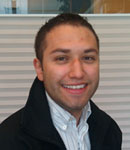« Prev Next »

Internships: Noah Espinoza

How did you choose your career? Was this an easy or hard process for you? If you struggled, how did you overcome these struggles?
I actually just fell into it, the hard way. I transferred from college to college three times and changed my major five. I just kept looking for something that I was interested in and that I enjoyed the work. Granted, it took me six years to finish my B.A., but I really do love public health science.
What kind of training, both formal and informal, did you receive to prepare you for your career?
I applied for summer internships in health sciences so that I would have an opportunity to gain experience. I also was required to do a "field experience" in order to graduate. That gave me real world experience.
If applicable, how did you select where to attend graduate school?
After working at the FHCRC for a year, I had developed an understanding of research, but felt that I still needed to understand more. More methods, more statistics, a more fundamental understanding of how to conduct research studies.
How did you choose what additonal training to pursue and how did you choose where to do it?
I would suggest applying to as many summer internships that you can possibly handle. Then choose the one at the best facility.
How competitve and/or rigorous was the training for your career?
The actual coursework was not very rigorous and my classmates and I helped each other out with assignments and group projects. That's one thing that I liked about public health as well: it's very cooperative work.
In general, how much did the training cost? Was the investment worth it?
Well, I have some student loans, and I got paid to do the internship. Both were worth the time/monetary investment because they propelled me further into my professional development.
How long did it take you to train? Was it shorter or longer than anticipated? If you had any setbacks, how did you deal with them?
I'm still in training now and I plan to be in training for at least five more years. That may seem like a long time, but one thing that I'm excited about is developing the skills to become a professional. I want to be good at what I do.
What was the process like to apply for your first job after your training was over? Was it easy or difficult? How did you cope with any difficulties? Did that differ from subsequent jobs you've had?
My situation is a little different than most. I was asked to come back to the FHCRC after my internship was over. One thing I would suggest is that you do everything asked of you in your training and then do more. Don't just settle for what is presented; take that and expand it. Ask for more work (after you finish what has been assigned) and ask for more training.
What advice would you give to someone interested in following a similar career path?
Make sure you know in your heart that this career is what you really want to do. Don't be afraid to take the time to find this out. Be prepared to work hard and go the extra mile.
What would you have done differently in preparing for your career?
I would have tried to start earlier. Sometimes figuring out what you really want takes time, and so there is a trade-off.
How much do you like what you do? Why? Is it what you imagined it would be? If not, how have you adapted?
I really love public health and epidemiology because we use it to stop the spread and impact of disease. We use it to understand what things are influencing mortality/morbidity and use those insights to make positive changes in a person's health. Although there are many other things that come with carrying out a research design, being able to find results that matter makes the journey and hard work worth it.
How do you achieve career-life balance? Is this easy or hard to do? How many hours do you typically work per week?
I only work forty hours a week, which compared to the principal investigator, is nothing. This gives me a chance to rest on the weekends and go have fun. I expect that as I go further in my career path I will have to give up more free time, but I will definitely make sure that I save some time to relax and recover; work hard, play hard.
What strategies have you figured out over time to help you succeed?
When things get tough and overwhelming, take a moment to look at the problem as a whole. Identify what is causing the stress and work towards a remedy. In other words: don't get overwhelmed by problems, just analyze your situation and work towards making things easier for yourself.
How do you see your field changing in the next 5–10 years?
I'm not at the level to give an insightful prediction here.
Anything else you would like to share?
Don't get discouraged with the training that you will have to do to become successful in you career. Half of the journey to becoming who you want to be is actually learning how to do the things you enjoy. Careers are no different. If it takes seven years for you to become an expert, then take seven years to learn how to do it well, and become the expert you want to be.

Within this Subject (45)




















